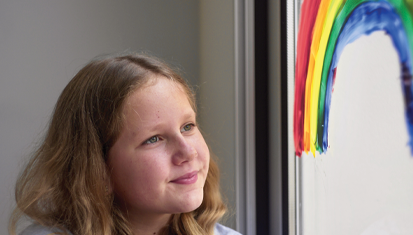Education policy in England and Covid-19: The road to recovery
Education policy in England and Covid-19: The road to recovery
As the world continues its fight against coronavirus, education and children’s services are amongst those navigating through these difficult times to find their “new normal”.
Amongst those adapting to this ever-shifting landscape is the state education sector in England. Ready to respond to the social impact of Covid-19, the Ecorys team has been keeping a watchful eye on how the crisis might alter the priorities of the sector going forward.
A clear path for education policy in 2019
In 2019, the newly elected Conservative government set aside billions of pounds to invest in state education. This included a £7.1bn uplift of schools’ budgets by 2022-23, a comprehensive review into special education needs provision across state schools, and a package of initiatives to encourage more people to join teaching. Furthermore, with Ofsted overhauling their inspections in September 2019, many schools were in the midst of preparations for their first inspection under the new framework before the pandemic hit.
The coronavirus crisis has no doubt left question marks over the future of these policy initiatives. Significantly, many of these announcements were made during a time of economic growth. Yet, amidst a shrinking global economy and warnings of “unprecedented recession” in the UK, it is unclear whether the government will need to reassess some of its spending promises across the public sector. While some of the additional money for schools is already guaranteed, and the education secretary, Gavin Williamson, has already confirmed that the SEND review will continue, it is unclear what will remain or be dropped from the government’s agenda in the years to come.
Covid-19 and vulnerable young people
Perhaps the biggest driver of policy change will not, however, be the economy, but the changing profile of need amongst young people whose education and wellbeing has been impacted by lockdown.
A recent paper from the Children’s Commissioner demonstrates that the Covid-19 pandemic has led to the loss of roughly 575 million school days for children across the country since March. It has also exacerbated hardship and safeguarding issues for many of the UK’s most vulnerable pupils. The Children’s Commissioner notes that there are 2.2 million young people (under 17) living in households with one or more of the “toxic trio” of safeguarding indicators; alcohol/ drug dependency, severe mental health concern, or issues of domestic abuse. With social care referrals falling by a fifth in April, there are concerns that the closure of frontline services (e.g. schools and youth services) made many of those who needed urgent support “invisible”. This led to concerns being raised by Labour and the Children’s Society of a “surge” in safeguarding and children’s care referrals as schools reopened in September.
Covid-19 has had a profound effect on young people’s mental health. A recent survey of 2,111 under 25s for YoungMinds found that the crisis is likely to have exacerbated existing problems. Mental health concerns are particularly significant for individuals with certain special educational needs who are particularly at risk of declining mental health through Covid-19. This is something Ecorys is exploring as part of our Nuffield funded study Growing up under COVID-19,. Here we are looking at how the crisis has impacted on young people’s daily lives, attitudes and beliefs across the UK, Singapore, Lebanon, and Italy.
The crisis has demonstrated stark differences between those from disadvantaged backgrounds and their more affluent peers. With the majority of education moving online during lockdown, access to technology has become vital for learning. Yet 2014 ONS data from Scotland found that nearly all households with an income of £40,000 or more per annum had internet access, while this was only the case for half of those earning between £6,000 and 10,000 per annum. More recently, a survey from the Institute for Fiscal Studies found that young people in the poorest fifth of households spent over 75 minutes less on home learning than those in the wealthiest fifth of households, again demonstrating a wealth divide in terms of access to learning at home during the Covid-19 crisis.
While the examples above only touch upon the impact of Covid-19 on young people, data demonstrates that the most vulnerable will be hit hardest by the crisis. While data from the Department for Education shows that the large attainment gap between disadvantage and non-disadvantaged pupils has narrowed slightly since 2011, emerging analysis by the Education Endowment Foundation suggests that there will be at least a reversal of the progress made. This is hugely disappointing given the time, money and effort that has gone into making these modest yet important steps.
Looking beyond the immediate Covid-19 crisis
There are three priorities which are at the top of all schools’ lists. These are:
- Maintaining the health and safety of students, staff, and the community
- Maximising student learning and wellbeing
- Supporting teachers and staff.
The government is also funding £1 billion worth of catch-up funding to bridge the learning gap for those who have fallen behind in their schooling. Other policy initiatives suggested included the introduction of a recovery curriculum, short-term increases to the pupil premium rate, and increases to the number of teachers in schools. This is on top of the initiatives introduced earlier in the year, including relaxing legislation around child social care, the introduction of a national online learning platform, investment in digital resources for disadvantaged young people, and voucher schemes to continue free school meals provision.
The education sector faces a long journey to reverse the negative impact of Covid-19 on children’s wellbeing and learning. Echoing the words of Robert Halfon, Chair of the Education Select Committee, the past 6 months has been nothing short of “a national disaster for education”. There is still much uncertainty as to what will happen over the next few months in terms of the crisis. Yet, as ways of working eventually morph from crisis to recovery and beyond, disruption to the status quo can be used as a way to create an even more equitable and effective education system. We at Ecorys are ready to help achieve this agenda and stand by to play our part in the coming years to help education systems understand the impact of covid-19 and support recovery.
For more information, please contact Senior Research Managers, Tom Fellows and Emily Mottram on email here: Tom.Fellows@ecorys.com and Emily.Mottram@ecorys.com

4 November 2020
5 minute read


